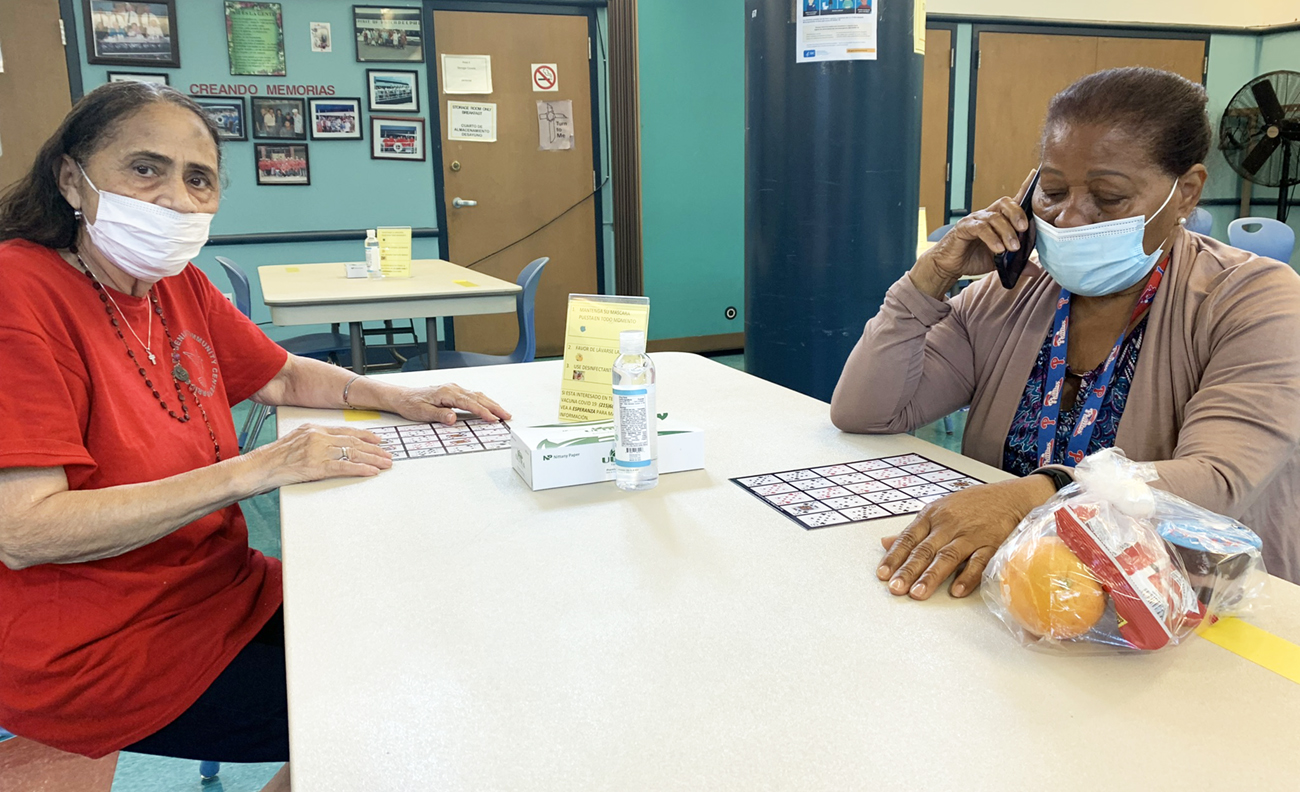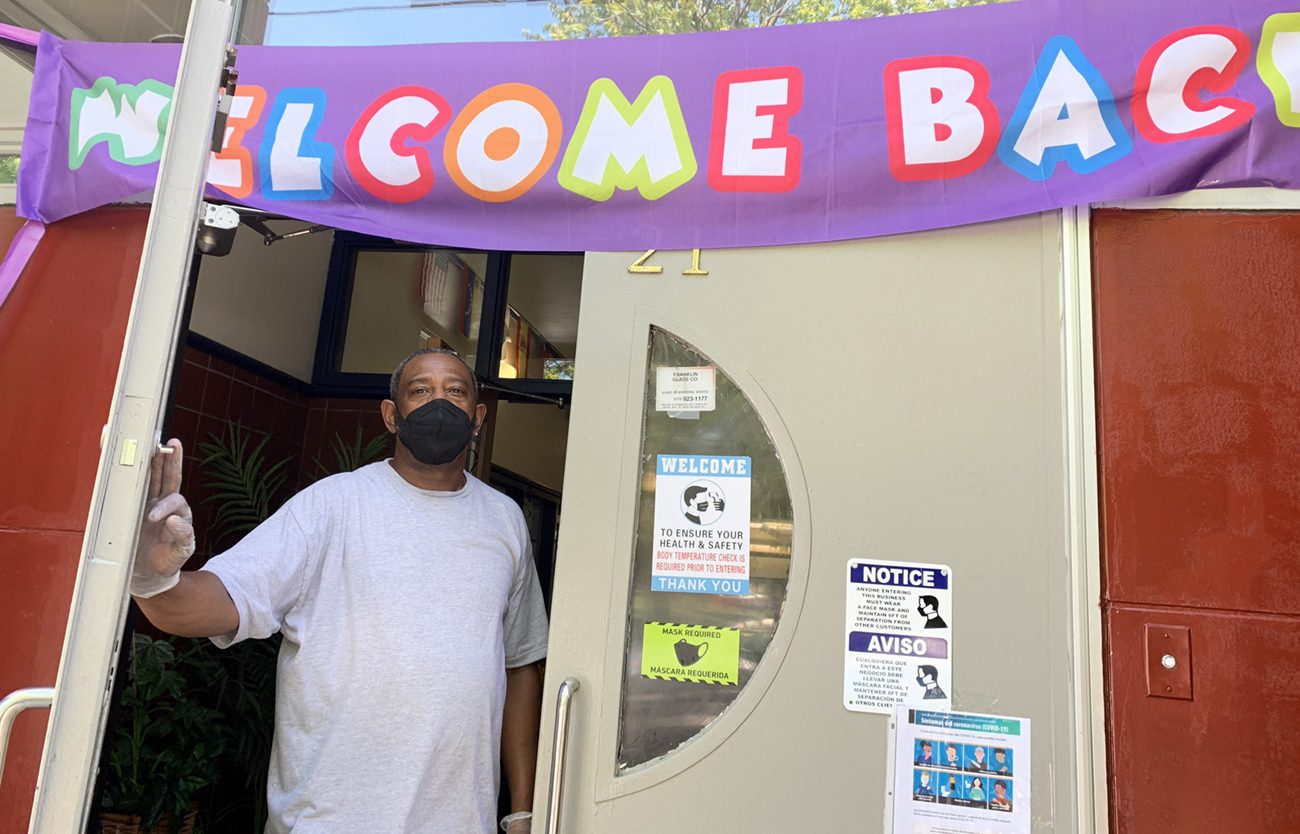For the first time since the onset of the COVID pandemic, archdiocesan senior centers opened their doors Monday to welcome clients back inside – and “back home.”
“Estamos vivos (we’re alive)!” said Bethzaida Butler, director of the Norris Square Senior Community Center, evoking a round of cheers from approximately 30 older adults seated in the facility’s main hall, which was decorated with festive banners.
Based in the city’s Kensington section, the center is one of four operated by archdiocesan Catholic Housing and Community Services (CHCS) as part of its continuum of care to older adults throughout the five-county area.
[hotblock]
Located throughout Philadelphia, the sites offer social activities, physical exercise, art classes, music, dance, meals and direct assistance in applying for benefits.
Like most businesses and community spaces, the centers ceased in-person gatherings last March to halt the spread of the coronavirus, which has disproportionately affected older adults. According to the CDC, individuals aged 65-74 are 95 times more likely to die of the disease than 18- to 29-year-olds, while the risk of death increases still more dramatically for those aged 75 and above.
Yet even with their doors shut, the CHCS centers became lifelines during the pandemic, providing area seniors with thousands of grab-and-go meals, wellness calls and COVID vaccinations.
After some 14 months of extremely limited social contact, though, seniors are “going stir crazy,” said CHCS director Heather Huot.
“We never stopped working for them and taking care of their needs, but it’s not the same as having them in our building, gathered as a community,” she said. “This really is a home, or a second home, for so many of the seniors.”

Andrea Lopez (left) and a companion prepare to enjoy a game of bingo at the archdiocesan Norris Square Senior Community Center June 28 after months of COVID restrictions on in-person gatherings at such sites. (Gina Christian)
In the pandemic’s initial phase, CHCS clients were “really frightened to come out,” said Karen Becker, the agency’s director of senior centers and in-home support programs. “They were very anxious and needed to stay at home, knowing they had to do so. They accepted that.”
As COVID “lingered on” and cases surged last November, however, “we really saw a downturn in people, a sort of hopelessness,” Becker said.
In the best of times, “winter is depressing for seniors,” she said. “It’s cold, it’s dismal and they can’t get out.”
CHCS staff noticed an uptick in “depression, anxiety and sadness” during their phone check-ins with clients, Becker said. “All of that, along with not seeing their families, just piled up.”
Vaccination rollouts, including those sponsored by CHCS, have sparked “hopefulness and joy,” she added. “There’s some normalcy again.”
That sense of stability has been enhanced by the centers’ reopening, which was carefully planned to conform with regulations and guidelines from the Pennsylvania Department of Health, the City of Philadelphia and the Philadelphia Corporation for Aging, said Huot.
“It’s stricter here than it is among the general public at this point,” she said.
Masks must be worn at all times in the senior centers, which have limited hours and occupancy. Clients are encouraged, but not required, to get vaccinated, and must complete a screening questionnaire before entering the sites. Social distancing signage and hand sanitizer dispensers are prominent throughout the buildings.
At present, the centers are still unable to return to serving congregate meals, a restriction Huot calls “a real heartbreak,” since the daily breakfasts and lunches “bring people together.”
Becker agreed it’s “challenging” for CHCS staff to balance the desire to resume full operations with the need for caution.
“We want to do so much more,” she said. “We want them to be able to eat their lunch; we want them to be able to sing and dance, but it’s going to take time.”
That’s fine by 81-year-old Norris Square regular Andrea Lopez, who for the past seven years has volunteered to serve her fellow seniors coffee while running errands for them.
“This is a great moment,” said Lopez, speaking in Spanish after Butler’s opening prayer on Monday. “Muy contenta (very happy). I need the seniors.”
PREVIOUS: Pioneering Black priest a model for healing racism, says archbishop
NEXT: New commission maps racial healing through encounter, dialogue, says archbishop



Share this story